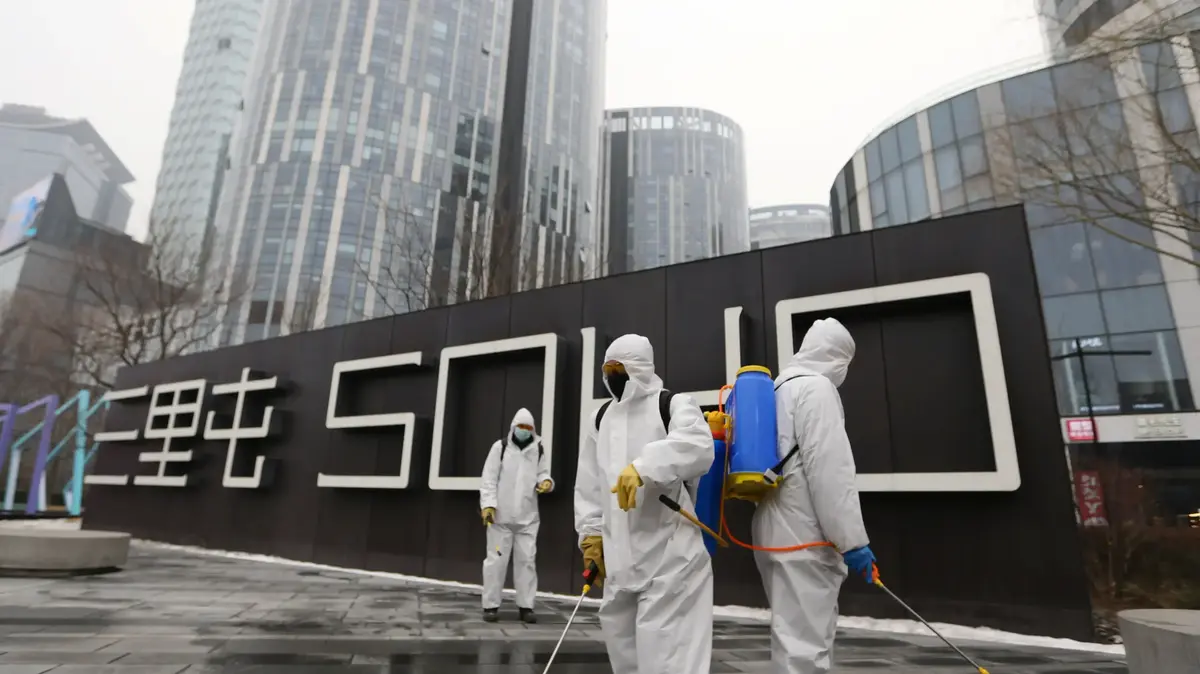The unfamiliar side of the virus: Get to know the big benefits of the Corona scare
Health catastrophe? Global economic crisis? Impact on global tourism? There are also some that the Corona storm of the past few weeks is a great celebration for them
While the whole world wears masks - real or metaphorical - against the backdrop of the Corona horror, there are also quite a few people laughing behind the mask. The global panic losers will be cut short: from economies hit all over the world and the downturns (and then resurfacing), through the blown airline and tourism companies, quite a few factories and industries, and most of all one giant country called China that is already talking about losing a full percentage of GDP (And more than $ 12 trillion is quite a bit of money).
But there are also quite a few who come out, or at least get out, from this horror. From rival powers, through countries striving to take a share of what China loses in supplying raw materials and production, to seamstresses in Jerusalem and Gaza; From the pharmaceutical and masks industry, to the World Health Organization entering Ego Trip to our health minister, Jacob Litzman, who appears every day in the news and on the road shakes his pedophile protector's image in favor of a public health knight. And of course the media, such catastrophes are the best time.
The trade war: a victory for Trump from an unexpected direction
As mentioned above, the main casualty is China and, in particular, its economy, the consequences of which can be very serious, subject to the course of events. Leading potential hires from the more serious side of the spectrum are US President Donald Trump and his trade war in China.
"The trade war is not a craze for Trump," explains economist Prof. Dan Galai of the Hebrew University. "It has a rational basis, although we do not always like the way Trump works and what he does. The trade war stems from the United States' huge trade deficit. Its - about a trillion dollars. That was also why Trump canceled the Nafta agreements with Canada and Mexico and the trade agreements with Europe. In this sense, what happens to China plays into its own hands: When imports are less, the disparity in the deficit is narrowed and the dollar strengthens. Achievements for the upcoming elections in the United States. "
What the United States earns from the matter, another senior economist believes, is "mainly ego. All the time we say the trade war is a war over economic, financial and technological supremacy. And here, China, the world's second-largest economy, is slapping a cheek slap that will take a good few years to recover from. "The corona will be over in a few months and everything will return to normal, but in terms of image, the damage will remain for a longer time. The Chinese thought their yuan would someday be a dollar competitor, which is a candidate to be the world's first economy. Now these things will be stepped aside for many years."
The big loser, Professor Eitan Gilboa, an international relations expert at Bar Ilan University, believes is the trade war itself. "To some extent," he says, "what happened made this war worse. After all, the problems in China's relations with the United States were, first and foremost, a huge trade deficit of hundreds of billions in favor of China (meaning the Chinese sold to the US far more than they bought from it); Second, the fact that they played with their own currency and set artificial (lower) gates for it to improve their state of competition in the world, and thirdly, theft of intellectual property.
"All these are now greatly diminished. Now China is not so well-known, because production is silent and, on the other hand, it is buying many things: it has called on companies in the world and countries to send medical equipment to them; they opened a hospital in the affected area one day and needed labs , Devices and drugs, and for intellectual property theft, it's obviously the last thing they're dealing with right now, so if that horrible disease contributes to something, it contributes to reducing the trade war, Trump has already dropped his belligerent statements on the issue because he wanted to moderate the trade war ahead of the election. She is now almost completely agitated. "
Global Economy: India may make a profit
It's hard to imagine a world without the factory and the huge source of resources named China. According to the World Monetary Fund, in 2009 China accounted for 16.3% of the global economy. But that number is relatively modest in importance: China is the world's largest exporter and the world's second largest importer. It is a source of raw materials such as coal and crude oil, various agricultural products, yarns, fabrics and more. She is the world's largest seamstress and is responsible for countless products and components in almost every product we buy: electronic components found in every camera and cell phone, such as those with heavy mechanical equipment, toys, consumer goods and in fact everything else that comes to mind. If China is weakening now, who is earning? And what will the consequences be?
You could think of other emerging markets that would benefit from shifting demand. For example, Brazil. "But Brazil's stock market," the senior economist says, "suffered severe declines because it is China's largest exporter of goods. So it is very difficult to do the calculation of the mantle rule, which takes direct and indirect effects, and see who will profit and who will lose."
"The answer requires a complex analysis that can only be done in historical perspective," says Prof. Gadi Ariab, a specialist in India and China from the Koller Faculty of Management at Tel Aviv University. "What can currently be said based on data can only rely on the SARS case study in 2003 , While trying to adjust the various effects of the epidemics. He said "the direct and measurable effects of the SARS epidemic on the capital markets disappeared six months later, and it is estimated that it has cost the world economy between $ 40 and $ 100 billion," the question is whether only direct or indirect effects are addressed. "The significance of this in the World GDP exam is on the order of between one-tenth and a half of that."
However, it is difficult to compare the two events. "Already, it is estimated that there are almost 10 times the coronary gland's adherence and diagnosis, but the death rate - which is ultimately the major source of panic - is about a quarter of what was in the SARS epidemic," says Professor Ariav. "The Chinese response has targeted the geographical area and meanwhile has significantly reduced the spread of the epidemic."
On the other hand, there is another parameter that makes it difficult to compare and it actually influences the other way around. During the SARS, China was far less significant in the global economy. Therefore, the fact that it lost one percent of its growth in those days had a zero impact on global analysis. ”Since then, China has of course become much more significant.
And if you try to identify countries that will benefit from the crisis?
"It is difficult to mark significant earning countries, but countries can also appreciate positive effects. In analyzing the energy consumption of various sectors, the impact of China's oil consumption alone - which is today the world's largest importer of oil - could benefit countries with a large agricultural sector. In this respect, India is perhaps the big beneficiary, because oil accounts for about a third of its import cost, while it is not a significant factor in its diverse and stable export.
"In the longer term, what might happen is that the hard lesson will translate into another diversification of production. Trump will surely try to bring some of the production home, and various industries, from fashion to electronics, will endeavor not to be so dependent on one factor for various and different reasons - from plague to gate closure. As a political step - may collapse their business.
"Economies that can be an agile substitute for Chinese production - such as Vietnam - can benefit from the multinationals' search for alternative manufacturing sites, but it will take months," says Professor Ariab.
And if you move from the macro to the micro, then as in any period of volatility characterized by great uncertainty, there are those who make money from the very oscillation. "There are those who know how to make volatile marketers," says Dr. Renana Peres of the Hebrew University's School of Business, who develops mathematical models that describe social phenomena. "Generally, people whose pockets are deep enough, and organizations that are robust enough to stand the risk, sell dearly , Buy cheap and take advantage of the situation. "
Masks: 55,000 packages a week
Those who managed to sell goods this year for a few weeks that are often not sold for a whole season are Hezi Luzon from Eitan Supplies, Israel's largest importer of private sector masks. "We usually sell 2,000 packages of 10 masks in the month, and last week we reached 55,000 packages and finished the stock. We were lucky to have had goods for a full season, but we did not anticipate demand." He said that those responsible for the tremendous demand are also Chinese who visit or live in Israel, who sent the masks they bought home to China, even before the extent of the danger became clear.
And today, you still have something left?
"Now even what we have kept aside for particularly sensitive people is already sold, now there is nothing."
Packing masks are usually sold for about NIS 10, so this is an income of hundreds of thousands of shekels, but Luzon is important to emphasize: "I do not want to make a cash out of the disease. If the epidemic passes and people want to return their masks - we will happily return them and give everyone money back." . He also notes that neither he nor the retailers selling the final product took advantage of the events to raise prices.
And right now, there are no masks.
"Most of them come from China, and of course what is produced there today goes to the local market and the shipments from China are stuck. Promise me a delivery that was due next week, and it has been rejected once and I expect it to be rejected again."
Medical Equipment: The timing of the disinfectants
As you can understand from Luzon's remarks, the profit he was supposed to make from the situation is a double-edged sword anyway, because as a basic medical equipment seller, China is its main supplier. "We see hospitals missing syringes, gauze, catheters - no one is preparing for such paralysis of China," he said.
That is, even if the corona does not come here, the shortage of equipment can affect local medicine.
"May. Unless supplies are resumed from China or other companies in the world divert their production lines from other medical equipment products."
Prof. Gili Regev, director of the Sheba Infection Prevention Unit, argues that most products can also be obtained from sources outside or near China - of course at a price that corresponds to the increase in demand, which is far higher. She said, meanwhile, the hospital was preparing for a shortage by reducing the waste in these products. "For example, if journalists want us photographed with masks for illustration, we disagree."
Those who do not suffer from the problem of shipping curfew from China - but perhaps vice versa - are Dr. Fischer, who manufactures a variety of disinfectants, including the popular brand Alcohol, and does so in Israel. According to Dr. Fischer Group CEO Moshe Silberstein, demand Of disinfectant consumers strengthened in January against influenza, then strengthened even more with the start of the Corona panic, so that today's sales rate is 250% higher than in the same period last year (this is before consumers contained the repositories they have at home). Only equipers, antiseptics are also increasingly used in the face of infectious disease awareness even without the corona actually arriving here.
"We make up 70% of the category," says Silberstein. "We have 22 different alcohol products, including wipes that are our only product and only them that can be brought on board. We are now bringing out three new products that you can report for the first time," he reports enthusiastically. "Go cream that can disinfect hands frequently without the skin of your hands drying, because cracked skin is more susceptible to transmitting infections; alcohol in spray and" Alkodog ", a package containing antiseptic together with the dog fecal collection bag. A similar product," Alcoholic " , Designed for a baby diaper replacement in the field. "
The company's products are now only sold to the final consumer after the Health Ministry unexpectedly decides that they must undergo special regulation of medical products before they can be sold to hospitals as has happened until recently. Following the order, Dr. Fisher delivered unsold material to hospitals to the private market, and the timing couldn't have been better for it. "We suddenly had two years of inventory (because of the new provision), and then sold it within two months to the big marketing chains, which bought it to Sell to the final consumer. We believe they will sell all the goods. "
And that is not all, due to the situation, the company has received orders from China and other countries for millions of dollars. "Orders are beyond our production capacity and reach us while many of the production lines are busy for the sun protection season, but we are ready to go missing that alcohol can save Haim".
In addition to alcohol, Dr. Fisher provides the home and medical market with additional antiseptic products such as Dramox and Dramaxol (Al-Soap Bacterial) for body disinfection, as well as polyidine. Silberstein reassures that the raw material has enough for another four months. " There could be a problem, "he says, if the epidemic still doesn't stop and its media coverage - which is actually the one that drives sales - will continue in the same way.
Vaccinations: Who will win the grand prize?
Those who greatly benefit from the Corona's alarm are drug companies that purport to develop vaccines or illnesses. Giant Gilad's share has risen by more than 9% since the beginning of February, adding $ 7 billion with a market cap of $ 87 billion, following the announcement that it is currently undergoing a trial in China of a drug that should also reduce the severity of the disease. The product was originally developed for Ebola disease and failed in its mission, but testing its activity in cells outside the human body showed potential for corona treatment, and the Chinese decided not to wait.
Of course, Giliad is not alone and there are now several bodies trying to develop a vaccine for the disease. Small vaccine company VIR rose 58% following its statement that its antibody isolation technology from recovered patients and injected into patients whose immune systems fail to fight the disease - may also be relevant for the corona virus. A modern company announcing that it is preparing to develop vaccines for disease has also seen a 10% increase in its share price, and the company is now trading at a value of $ 7.5 billion (it should be noted that these stocks have peaked, at least for the moment, and have actually begun to decline in recent days).
Healthcare Organizations: Public Relations and Future Budgets
Those who panic serve them in another, image-wise way, are academic and government agencies involved in vaccines, infection prevention and epidemic management. Vaccine experts who have so far been the most exciting thing about it in public have been circular internet debates with vaccine opponents, abruptly curtailed by major media outlets and of course the public is also much more interested and attentive to them than before. In general, the corona epidemic appears to have led to a renewed public affection for vaccines, and influenza vaccination rates are now on the rise in Israel, and possibly in other countries.
Also, such as the World Health Organization (WHO); the US Government's Disease Control Organization (CDC); And a Norwegian organization called the Epidemic Coalition Preparedness (CEPI), which estimates that it could offer a vaccine for the disease in less than a year - all receive positive attention and may benefit from budgeting for their benefit during the epidemic and in the future.
The World Health Organization has already sought to raise $ 675 million in public donations to treat the disease, of which 60 million will be allocated to the organization's own activities, and the rest to disadvantaged countries that need additional budget to cope with the disease. The Health Organization's activities include research funding, but also the delivery of masks and respirators from the Middle East (where they were set up to treat the previous epidemic, which originated from the Corona family called MERS) to the countries that need them.
The head of the organization, Dr. Tadros Adhnum Grabhisus, is the face of the organization in the media and social networks, but alongside appreciation and exposure, it is also widely criticized, among other things, that when the virus was just discovered, the organization actually claimed no curfew from China, and also So the organization canceled Taiwan's membership because of Chinese pressure.
Media: Victory for institutionalized media and opponents of globalization
The one who still earns is the media. Anyone interested in these dimensions, Dr. Peres says, "always makes a boost to media consumption." In this case, she says, "the one who benefits is institutionalized media, as opposed to social media. Because there are hardly any Chinese who report on social networks from the territory, China is a more closed place and has control over information. So to be up-to-date, people need to read the newspaper or watch the TV news release because the information is in the most institutionalized press. And once the institutionalized press has more demand, anyone who uses it as an advertising space has the potential to win the most demand because its ratings are rising. "
But panic also serves less pleasant factors. "The virus triggers a lot of panic, justice and smoother, and then the question is who gets that kind of panic, politically or socially," Dr. Peres points out. "And of course, those who are hired out are more likely to oppose globalization, less fond of development and connection. Interstate. For them, such an epidemic helps encourage seclusion and gives a boost to their worldview. "
And yes, even simple racism raises head as one sees throughout the world as well as in Israel in the form of an unpleasant attitude to "slant" on the street, even if they have lived here for quite a few years. Acting China's ambassador to Israel, Dai Yu-Ming, painfully compared the closure of Israeli borders to the Chinese during the Holocaust. Although the comparison was unsuccessful, the pain he spoke reflected the feelings of many Chinese, in Israel and in other countries.
Fashion: a temporary loss to the global economy
Another big earner, though temporarily, are the local businesses everywhere. "If one of the things most affected by this virus is all global vendors, then when the virus hits globalization, express owners and international shipping companies, local businesses - and unlike an American competitor like Amazon - has greater profit potential," says Dr. Peres.
And speaking of local businesses, let's look inside to Israel. The most colorful marker of change in Israeli consumption habits may be the upcoming Purim costumes. What will the parents who do not do before ordering the cheap costumes from China do? Will the local costume sellers (only a few of whom sew here, and the rest imported - in time, hopefully - of course from China) enjoy a more vigilant buyer movement? The logic says yes, but there is currently no data to confirm it and things are likely to become clearer closer to the holiday.
Purim is a small anecdote anyway. The more significant question is whether Israelis' online shopping frenzy will now be directed, at least in part, to local shopping malls and electricity chains. In the meantime, this is about potential rather than significant data in the field. "I think it is premature to assess the impact of the online injury," says a fashion expert. "If the crisis continues, we will see it next month. Whatever the case may be, there are already budgets for raising prices, and we have to see if the various deals will decrease somewhat relative to the same period. On the other hand, prices cannot be raised too much. Primark and Israelis are traveling a lot occur".
Meanwhile, the Chinese government has extended New Year's holidays to make time, but the fashion world is holding its breath to see what will happen in the slightly further distance. "In this business," a fashion expert explains, "production in China takes between 45 days and two months, the goods are in the sea for another month, and it takes one month from its arrival until warehouses are arranged and distributed to stores. That is," he concludes, "the ranges are about four months. Suffice for July-August, production has to start in March, and do not know what will happen not only with production but also with inland transport, and whether the ports will return to full employment. "
He said, "The pressure also creates opportunities to look for other sources, such as India, Bangladesh, Indonesia, Thailand and Europe. In Turkey, for example, wages in some places have been lower than in China - which in recent years has raised salaries and has begun to pay attention to social conditions."
And seamstresses in Israel can't enjoy it either?
"Some of the fashion players in Israel, such as Golbari, Renoir and Castro, do a small part of the activity in Israel or in the territories. There are still some seamstresses and places that cut them in Arab villages here in Israel, and there are seamstresses in Gaza as well. Is this crisis an opportunity for textile workers and workers in Gaza, East Jerusalem and the Arab villages in Israel? It all depends on the size of the crisis. "
Who already feels the benefits of the Corona is Salah Kharbawi, who owns Kharbawi Group, who defines his business "relatively large" to what remains of the local textile industry. He makes, for example, repairs to Castro, and small fashion manufacturers such as Maya Negri and Gertrude, meaning "for those who make small quantities at a high level."
And since the crisis broke out, are you getting more work?
"I do not wish anyone to fall into such illnesses, but I think we will have more work. That is how we hope. Contact me new clients, who I do not work with yet, those who work in China, and those who work in Turkey, because there they already smelled the situation and started to raise Those who contact me are not the big fashion chains but the ones who sell work clothes and produce in lesser quantities.
" Also on the price of my products. "
Tourism: Passover without Thailand
While television shows daily Israeli vacationers in Thailand and the East talk about how no one here goes with a mask, but families who are now planning the upcoming Passover holiday with the children, will not feel this year to choose a favorite hit destination. What's more, Health Minister Litzman issued a travel warning that also includes Thailand and Japan.
So where will the Israelis go on Passover and Summer? According to Ophir Tours, meanwhile, benefiting are the United States - where destinations are New York and the theme parks in Orlando and Los Angeles - and Europe. For the latter, the New East appears to be Eastern Europe, including cities such as Bucharest, Budapest, Prague, Sofia and Warsaw. Anyone who dreams of a beach vacation will settle for cold water parks in Europe.
"Lots of bodies want to panic"
Contrary to popular belief, there are also some who believe the impact on the global economy will be negligible anyway
It is widely believed that the Corona, whose high level of contagion, can spread throughout the world and is already a severe blow not only to China's economy but also to the world economy. But not everyone shares this opinion. "Pay attention," says Dr. Jacob Sheinin, investment house model, "because the World Health Organization called the Corona an 'outbreak' rather than an 'epidemic.' It is easy to catch, but the data shows that the mortality rate is 2%, compared to the SARS virus where the mortality rate was 10% (On the other hand, the number of dead from Corona in China has already exceeded the death rate from SARS due to the large number of infections, Q, C and C ). Meanwhile, the disease is mainly in China, and there are almost no cases in the United States and Europe. This is not the black plague or chicken pox. Nearly 100,000 Chinese people die each year, and 35,000 Americans die. "
Still, you can't say it's not a disaster for the Chinese.
"It may be severe in terms of human disaster in China, but it will not affect the global economy. It is not something that will significantly hurt Europe or the United States. In the worst case scenario, the product could fall by 2% to 1%, which is if 50% of Chinese are infected, and according to 2% statistics, 13 million Chinese will die. It's a humanitarian disaster, but it's one percent of the Chinese workforce. .









